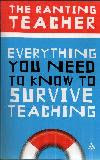
This week I received the advance copies of my new book: Everything you need to know to survive teaching - the second edition! And do you know what I thought, dear reader... what an excellent present it might make for the teacher in your life...
~Online ramblings since 2003~
